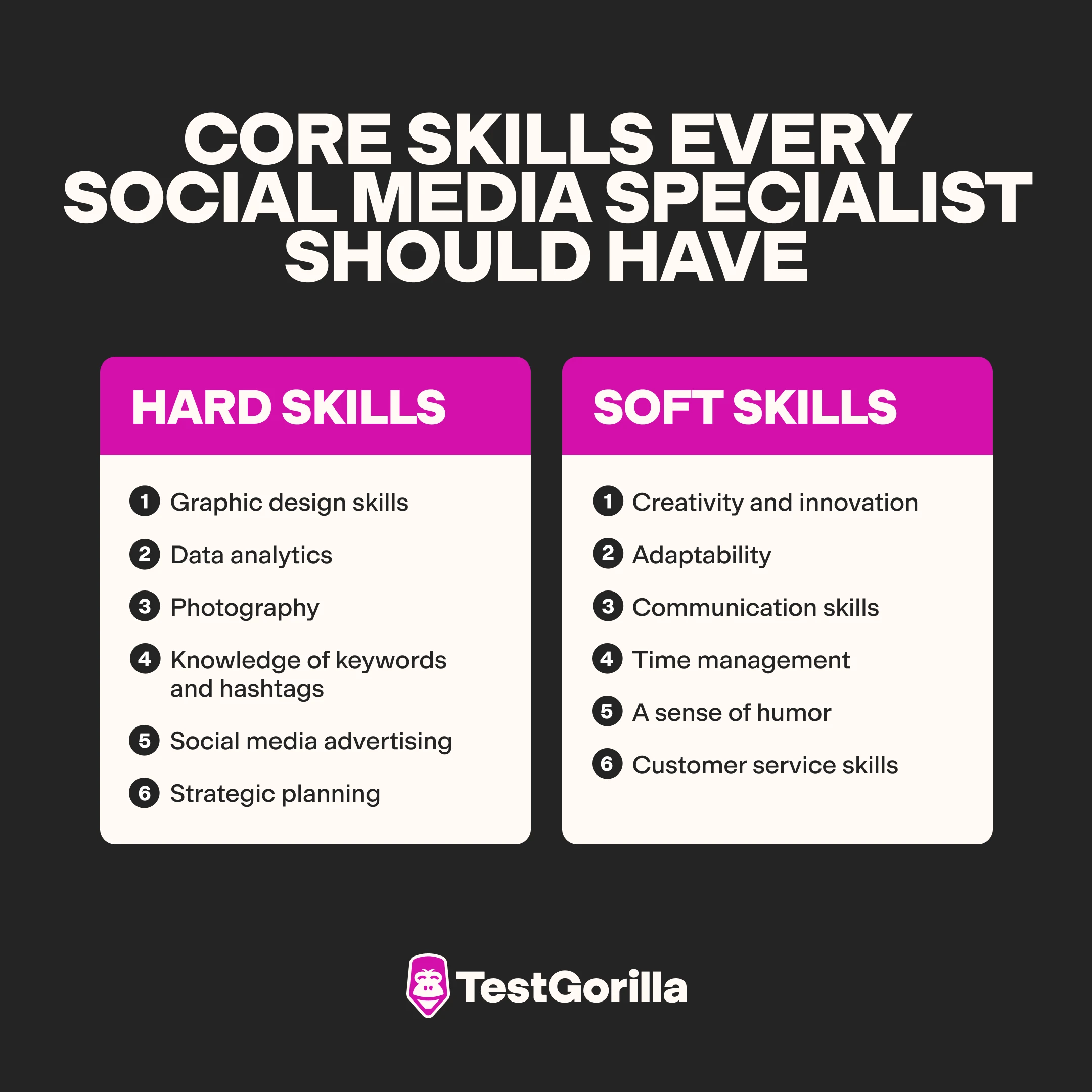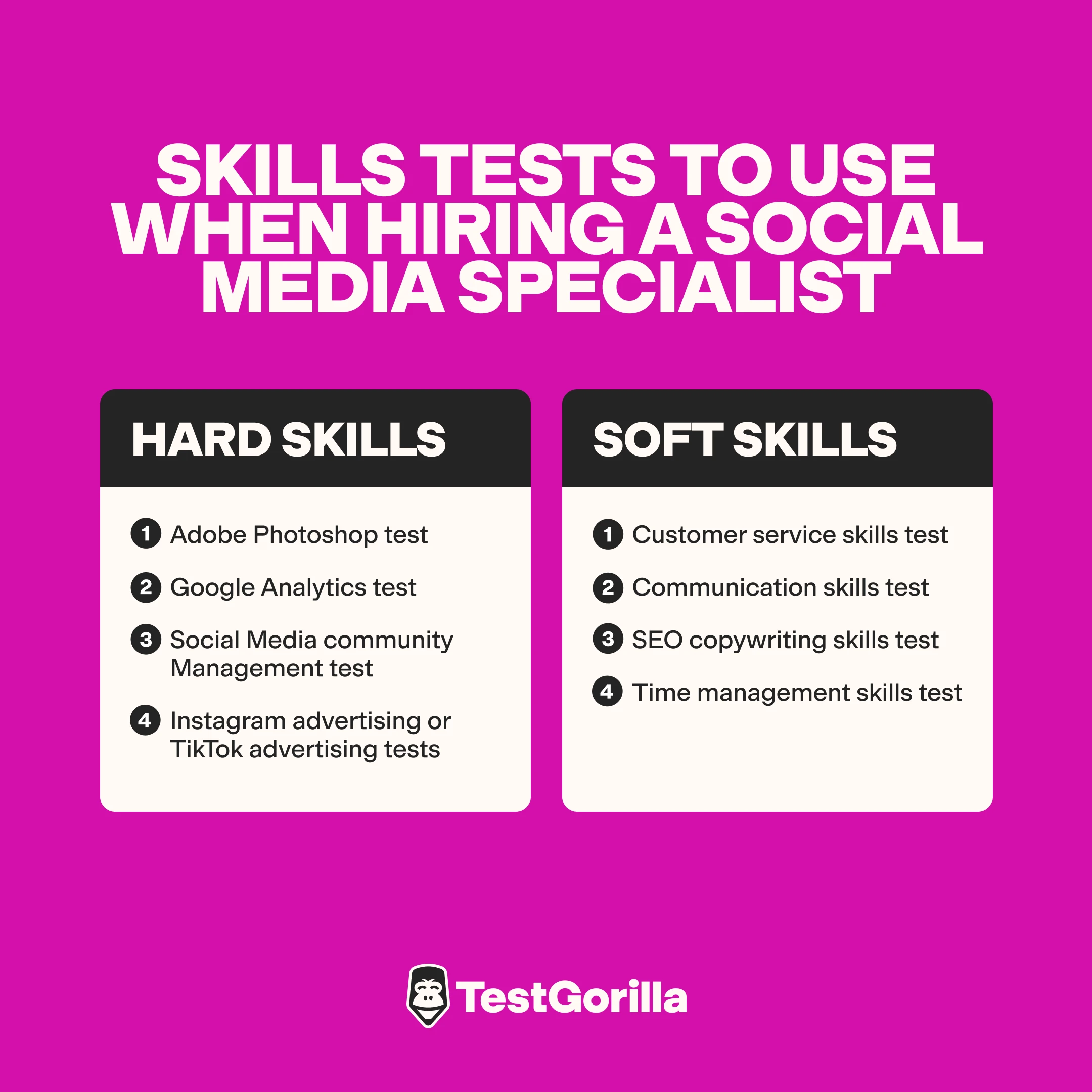Finding a social media specialist with all the skills, qualities, and expertise needed can feel like chasing a moving target. Social media platforms are always changing, and the pressure to churn out fresh, exciting content never lets up.
Top-notch social media skills can lead to viral campaigns that elevate your brand’s presence and foster genuine customer connections. But how can you find someone who’s up to the task?
This article breaks down everything you need to know about hiring social media specialists. Whether you’re looking for an understanding of the day-to-day job, what skills a candidate needs, or how to assess them, this article is for you.
What is a social media specialist?
A social media specialist is a marketing professional responsible for creating, managing, and analyzing content across social media platforms. They work to build your company's brand, engage with your audience, and drive traffic to your website or other digital properties.
But what does that mean in practice? On a day-to-day basis, a social media specialist wears many hats. They plan and schedule social media posts, ensuring that content is fresh and relevant.
They engage with your followers by responding to comments, messages, and reposts to foster a sense of community. They also answer customer questions, monitor analytics to track the performance of their campaigns, and adjust strategies accordingly. It’s a fast-paced role that needs someone fun, organized, and creative.
Core skills every social media specialist must have
Your social media specialist will need a mix of hard and soft skills to nail their role. You should look out for candidates who excel in the following areas.
Hard skills
Hard skills are the teachable, hands-on abilities that someone needs to do their job well. They usually include:
Graphic design skills. Knowing how to use tools like Adobe Creative Suite or Canva helps applicants produce high-quality images, infographics, and other visuals that make your brand pop.
Data analytics. Being good with tools like Google Analytics, Hootsuite, and Sprout Social helps track engagement, reach, and conversions. This data is key to tweaking strategies for the best results.
Photography. Basic photography skills allow candidates to capture, edit, and post images that align with the brand’s aesthetic, making your content stand out in busy feeds.
Knowledge of keywords and hashtags. Knowing how to use keywords and hashtags effectively increases visibility, drives more traffic to your website, and gets your content seen by more people.
Social media advertising. Running effective ad campaigns on platforms like Facebook, X (formerly Twitter), TikTok, and Instagram is vital. Understanding how to set up targeted ads, manage budgets, and analyze ad performance ensures your marketing dollars are well spent.
Strategic planning. Strategic planning involves setting goals, creating content calendars, and coordinating campaigns that align with the brand's objectives and resonate with the audience.
Soft skills
Soft skills are the personal traits and interpersonal abilities that affect how well a social media specialist does their job. These skills are often more about personality and include:
Creativity and innovation. Social media is always changing, so being able to come up with fresh ideas for posts, campaigns, and engagement strategies keeps your audience hooked.
Adaptability. A social media specialist needs to be adaptable, eager to learn, and quick to implement new strategies. This flexibility helps you stay relevant and take advantage of new opportunities to boost the brand’s presence.
Communication skills. Excellent communication is essential for engaging with the audience, working with team members, and consistently conveying your brand’s voice.
Time management. Good time management ensures content is posted consistently and deadlines are met. Being organized also helps balance daily tasks with long-term planning, which is essential for ongoing success.
A sense of humor. A good sense of humor helps in creating content that resonates with people and makes your brand more relatable. It can even turn around a negative situation.
Customer service skills. Empathy and good customer service skills are crucial for handling inquiries, complaints, and feedback with professionalism and care.
The best insights on HR and recruitment, delivered to your inbox.
Biweekly updates. No spam. Unsubscribe any time.
How to assess social media specialist candidates
Social media specialists need to have their finger on the pulse of what’s trendy and viral. They need to know what people are talking about and have the creativity to not only follow viral trends but also set them. A resume can’t tell you this, but pre-employment testing can.
By evaluating candidates' creativity, analytical abilities, and familiarity with social media platforms, pre-employment tests give you insight into a candidate’s potential. To see exactly how they can help you separate the wheat from the chaff, why not try out TestGorilla’s library of 350+ tests?
You can pick and mix up to five for free to create a bespoke assessment. In addition, you can customize pre-made questions, add your own questions, and see what assessments TestGorilla recommends for different roles.
Start with tests for the below skills and qualities.
Hard skills
These tests will help you measure which candidates know their stuff:
The Adobe Photoshop test will help you measure a candidate’s technical ability with this software, including whether they can use vector graphics and how well they manipulate photos.
The Google Analytics test will help you measure how well a candidate uses Google Analytics. This includes a candidate’s ability to manipulate data, how well they use reporting to visualize data, and how well they track data across systems.
The Social Media Community Management test will help you determine how well a candidate can plan and manage content, plus assess their communication and moderation skills.
You can measure a candidate’s knowledge of social media advertising using the Instagram advertising or TikTok advertising tests respectively. These help you measure how well they know these platforms and their ability to manage paid campaigns on these platforms.
Soft skills
Once you’ve nailed down the hard skills, it’s time to move on to soft skills.
The Customer service skills test is perfect for measuring how well candidates communicate with your customers and audience and whether they can infer customer needs.
The Communication skills test will measure an applicant’s written communication skills and how well they summarize messages. You should also consider the SEO copywriting skills test to determine whether a candidate can write snappy captions and work with user search intent.
The Time management skills test will help you measure whether candidates can spin multiple plates effectively. You can assess their ability to prioritize, plan, and execute their to-do list.
Shake up your culture with a new hire
Hiring for culture add doesn’t mean hiring clones of your current team – in fact, it can mean the exact opposite.
When you focus on culture add, you're looking for candidates who align with your core values but bring something unique to the table. They should share your organization’s vision and mission while offering different viewpoints that challenge the status quo and inspire growth. This approach encourages a dynamic, inclusive environment where creativity and innovation flourish.
Try using TestGorilla’s Culture add test to measure this. This test gives candidates’ a list of words that align with specific skills and behaviors, and are typically at two ends of a spectrum. For example, one might be analytical versus creative. The candidate then ranks which is more important for them.
You also rank your company’s values before sending the test to candidates, which enables you to see how well their values align with your company’s culture.
Round off with behavioral interviews
The final step of your selection process should include behavioral interviews. Behavioral interviews differ from traditional interviews in that they focus on how candidates have handled real-life situations in the past. This approach helps you understand their thought processes, problem-solving abilities, and how they align with your company's values and culture.
Try asking questions like:
“Can you tell me about a time you had to deal with negative press on social media? What happened and how did you handle it?”
“Tell me about a time you had to collaborate with a different team to deliver a project. What was your role and how did you contribute?”
You can also bring up information they’ve listed in their resume (if you’re using their resume). Try something like:
“I can see here you grew your previous employer’s Instagram account from 1,000 to 30,000 followers in a year. That’s impressive! Can you talk me through how you designed your social media strategy?”
You can find more behavioral style interview questions here. Alternatively, check out this article on 50 social media questions for social media managers and professionals.
3 mistakes to avoid when assessing candidates
Watch out for these common mistakes when hiring your next social media specialist.
1. Neglecting customer service skills
Amy Jo Martin, an author and social media expert, once said, “It’s a dialogue, not a monologue, and some people don’t understand that. Social media is more like a telephone than a television”.
Social media management isn’t just about making your feed look pretty and racking up lots of likes. It’s about genuinely connecting with your audience and building lasting engagement. Overlooking customer service skills means missing out on candidates who can handle interactions with empathy and professionalism, turning potentially negative situations into positive experiences.
2. Overemphasizing personal follower count
While personal follower count can indicate skill or social media activity, it’s not always a reliable measure of their ability to professionally manage a brand’s social media presence.
After all, a candidate might have a large following for personal reasons that don’t translate to professional expertise. They may have purchased their followers online or have grown a large following by posting content that’s irrelevant to your brand.
Instead, focus on their experience managing brand accounts, their ability to create engaging and relevant content, and their success in achieving specific business goals through social media.
3. Focusing only on major platforms
Don’t underestimate LinkedIn, Pinterest, or other niche social media skills when hiring a social media specialist. The world of special media is always changing, and managing multiple brand accounts across different platforms shows strong fundamental skills that translate across the board.
Plus, a candidate with skill across various platforms can mix up strategies and innovate your social media presence, helping you reach a broader and more diverse audience.
FAQs
What is the average salary of a social media specialist?
Social media specialists are paid an average of $50,423 in the US according to Payscale.co.uk. They earn around $38k on the low end or $68k on the high end.
What does a social media specialist do?
Social media specialists are tasked with effectively running a brand’s social media accounts. They plan social media strategy, design graphics, interact with customers, and curate content to engage your audience.
Go viral with TestGorilla’s pre-employment tests
Social media specialists are the heartbeat of your social media team. They create engaging content, interact with your audience, and help your brand stay relevant in an ever-changing digital landscape. But, to find the best talent, you need a thorough and effective hiring process.
Resumes are dead. There, we said it. Pre-employment testing is the way forward. It’s the only way to identify top talent and find someone with the creativity, communication, and data analytics skills you need to stand out on a saturated social media feed.
Try TestGorilla’s pre-employment testing tools. You can easily create bespoke tests, design custom questions, and choose from various pre-made assessments tailored to the skills you’re looking for.
Check out the library of “350+” tests to see what you’re missing. Alternatively, schedule a live demo, or sign up for a free TestGorilla account today!
You've scrolled this far
Why not try TestGorilla for free, and see what happens when you put skills first.




















